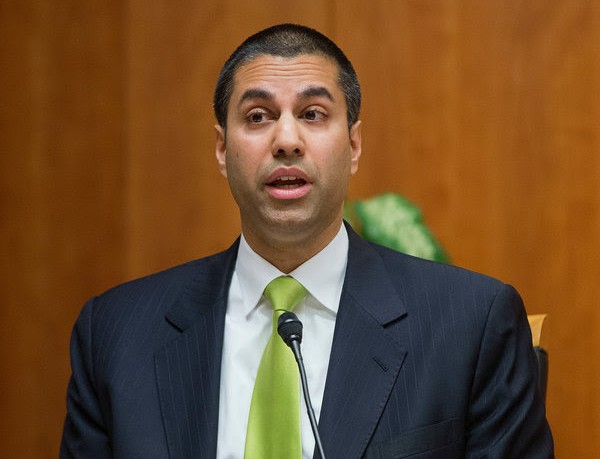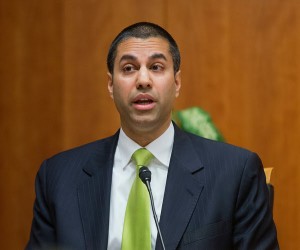NYT
by Cecilia Kang
Ajit Pai, the chairman of the Federal Communications Commission, met with Facebook and other tech companies this week to seek feedback on his intention to unwind aspects of net neutrality, the rules that require broadband providers to make all internet content equally accessible for consumers.
Mr. Pai said on Thursday that his visits with executives at Facebook, Cisco, Oracle and Intel were constructive and that he believed the companies wanted to find “common ground.” Web companies have supported net neutrality, saying the protections guard them from paying tolls to get their content in front of consumers. Mr. Pai said that he agreed with the broad principles of net neutrality but that the rules, created by the commission in 2015, went too far in restricting broadband providers.
“I think they were appreciative,” Mr. Pai said of the tech companies. “I have been soliciting thoughts on online protections.”
Mr. Pai spoke at a news conference on Thursday after pushing through more rollbacks of Obama-era regulations. Appointed by President Trump in January, Mr. Pai has been on a deregulation charge. He has abolished a proposal to open the cable box market and frozen a program for broadband subsidies for low-income households. On Thursday, he passed two actions that will ease pricing restrictions on telecom giants and give broadcast television companies greater latitude to bulk up through mergers.
Mr. Pai’s biggest targets are net neutrality and the classification of broadband like a utility. He has the broad support of Republican lawmakers and is expected to introduce a plan that would weaken aspects of the net neutrality rules as soon as this month.
Mr. Pai said on Thursday that he wanted to overturn the declaration of broadband as a utility-like service, which puts stricter rules on broadband providers, akin to what phone services face today.
Facebook and Intel did not immediately respond to a request for comment about Mr. Pai’s remarks. The Internet Association, a trade group that represents Facebook, Google and Netflix, recently met with Mr. Pai and urged him to keep the rules intact.
A Cisco spokeswoman said Mr. Pai had asked the company’s chief executive, Chuck Robbins, to gather some Silicon Valley leaders to discuss the future of net neutrality. The informal discussion was held at Cisco’s campus in San Jose, Calif., the spokeswoman said.
In a statement, Oracle said its discussion with Mr. Pai this week was broad and did not address any specific policy proposals currently under consideration. Oracle has previously said it supports Mr. Pai’s agenda, and its meetings with him have included one with the company’s chief executive, Safra Catz, who was on Mr. Trump’s transition team.
The commission’s direction under Mr. Pai has alarmed consumer groups. Michael Copps, a former Democratic commissioner, said companies like AT&Tand Comcast that have heavily lobbied the commission to roll back rules would directly benefit from the recent actions.
“This is the price we pay for the outrageous influence of money in politics,” said Mr. Copps, a special adviser to the consumer group Common Cause. “The public interest suffers, and we are poorer — economically and civically — for it.”
In votes split down party lines on Thursday, Mr. Pai pushed forward a plan that will ease standards to allow telecom carriers like AT&T and CenturyLink to raise fees for small businesses, wireless carriers, hospitals and libraries to connect to the main arteries of their broadband networks. AT&T and other telecom giants had heavily lobbied for the new rule.
In a dramatic reversal from the Obama administration, which was pushing for caps on pricing, Mr. Pai said telecom companies should have more freedom to set their own rates. “Price regulation threatens competition and investment,” he said.
The commission also approved a separate proposal easing restrictions on broadcast television corporations seeking to buy more stations. Mignon Clyburn, the Democratic commissioner, voted against the proposal and warned that greater media consolidation would give fewer companies a bigger voice.
“This is industry consolidation month” at the F.C.C., she said.








